The GEO Group Bundle
Who Really Owns the GEO Group?
Delving into the ownership of the GEO Group, a major player in the private prison company sector, is essential for any investor or stakeholder. Understanding the GEO Group ownership structure provides critical insights into its financial health, strategic direction, and the ethical considerations surrounding its operations. As a real estate investment trust (REIT) focused on correctional facilities, the company's performance is intrinsically linked to its shareholders and the broader market dynamics.
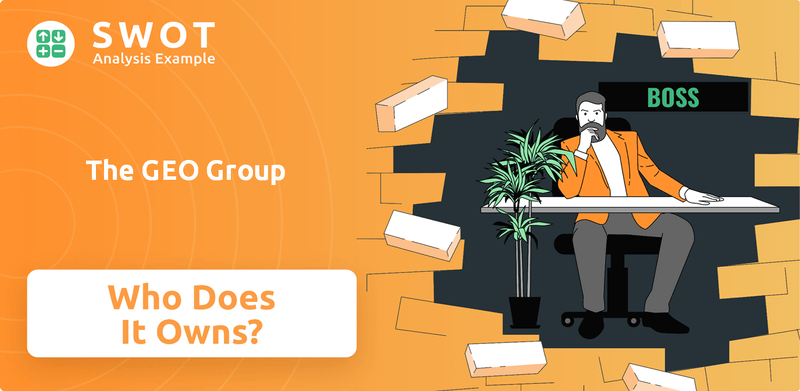
From its roots as Wackenhut Corrections Corporation to its current status as a publicly traded entity, the GEO Group's evolution reflects significant shifts in ownership and strategic focus. Examining the influence of institutional investors, mutual funds, and individual shareholders is key to understanding the company's responsiveness to market pressures and its ability to adapt to changing public policy. For a detailed look at the company's strengths and weaknesses, consider The GEO Group SWOT Analysis.
Who Founded The GEO Group?
The GEO Group company, initially known as Wackenhut Corrections Corporation, was established in 1984. It was founded by George C. Zoley, who had a background in corrections and public administration. Zoley's vision was to provide private sector solutions to government correctional systems.
Early ownership details of the GEO Group are not publicly available. However, it is known that George C. Zoley played a key role in setting the company's initial direction. Early ownership likely involved Zoley and a small group of initial investors who believed in the privatization of correctional services.
The early stages of the GEO Group involved securing private funding from individuals or small investment groups. This capital was essential for the company to obtain its first contracts and expand its operations. Agreements such as vesting schedules and potential buy-sell clauses were common to ensure founder commitment and provide liquidity options for early investors.
The founding team's focus on efficient, privately managed correctional facilities was reflected in the initial distribution of control. This emphasized a lean operational structure and the securing of government contracts. The early ownership structure appears to have been relatively stable, facilitating the company's initial growth.
- George C. Zoley: Founder and key figure in establishing the company's direction.
- Initial Investors: Likely included individuals or small groups who provided early funding.
- Private Funding Rounds: Used to secure contracts and expand operational footprint.
- Operational Focus: Emphasis on efficient, privately managed correctional facilities.
If you're interested in learning more about the company's strategic direction, consider reviewing the Growth Strategy of The GEO Group.
The GEO Group SWOT Analysis
- Complete SWOT Breakdown
- Fully Customizable
- Editable in Excel & Word
- Professional Formatting
- Investor-Ready Format
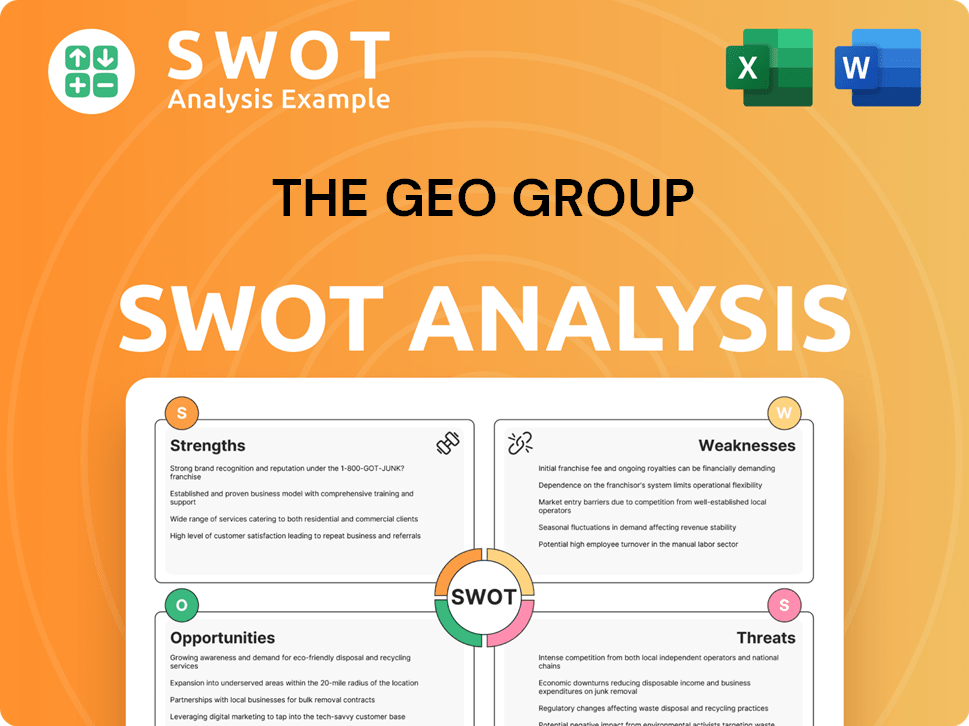
How Has The GEO Group’s Ownership Changed Over Time?
The ownership structure of The GEO Group, a prominent private prison company, has evolved significantly since its inception. A major turning point was its initial public offering (IPO) in 1996. This transition from private ownership to a publicly traded entity enabled the company to attract broader investment and secure capital for expansion. The IPO marked a crucial step in the company's growth trajectory, allowing it to scale its operations and increase its market presence.
Another significant shift in the company's ownership occurred in 2013 when it converted into a real estate investment trust (REIT). This strategic move aimed to attract investors seeking dividend income and exposure to real estate assets. As a REIT, The GEO Group was required to distribute a substantial portion of its taxable income to shareholders, which influenced its investor base and business strategy. This conversion underscored the company's focus on real estate management and long-term leasing agreements with government entities, further shaping its financial and operational landscape.
| Event | Impact on Ownership | Year |
|---|---|---|
| Initial Public Offering (IPO) | Transitioned from private to public ownership, enabling broader investment. | 1996 |
| Conversion to REIT | Attracted investors seeking dividend income and real estate exposure. | 2013 |
| Institutional Investment | Increased influence from asset management firms, hedge funds, and pension funds. | Ongoing |
As of early 2025, The GEO Group's shares are primarily held by institutional investors, mutual funds, and individual shareholders. Major institutional investors, such as Vanguard Group Inc., BlackRock Inc., and State Street Corp., often hold substantial percentages of the company's outstanding shares. These institutional holdings significantly influence the company's strategy and governance. For more insights, consider reading about the Growth Strategy of The GEO Group.
The GEO Group's ownership structure has evolved significantly, starting with its IPO in 1996 and later converting to a REIT in 2013. Institutional investors currently hold a significant portion of the shares, influencing the company's strategic direction.
- The IPO in 1996 allowed for broader investment.
- Conversion to a REIT in 2013 attracted dividend-seeking investors.
- Institutional investors, like Vanguard and BlackRock, are major shareholders.
- Ownership structure impacts the company's financial performance.
The GEO Group PESTLE Analysis
- Covers All 6 PESTLE Categories
- No Research Needed – Save Hours of Work
- Built by Experts, Trusted by Consultants
- Instant Download, Ready to Use
- 100% Editable, Fully Customizable
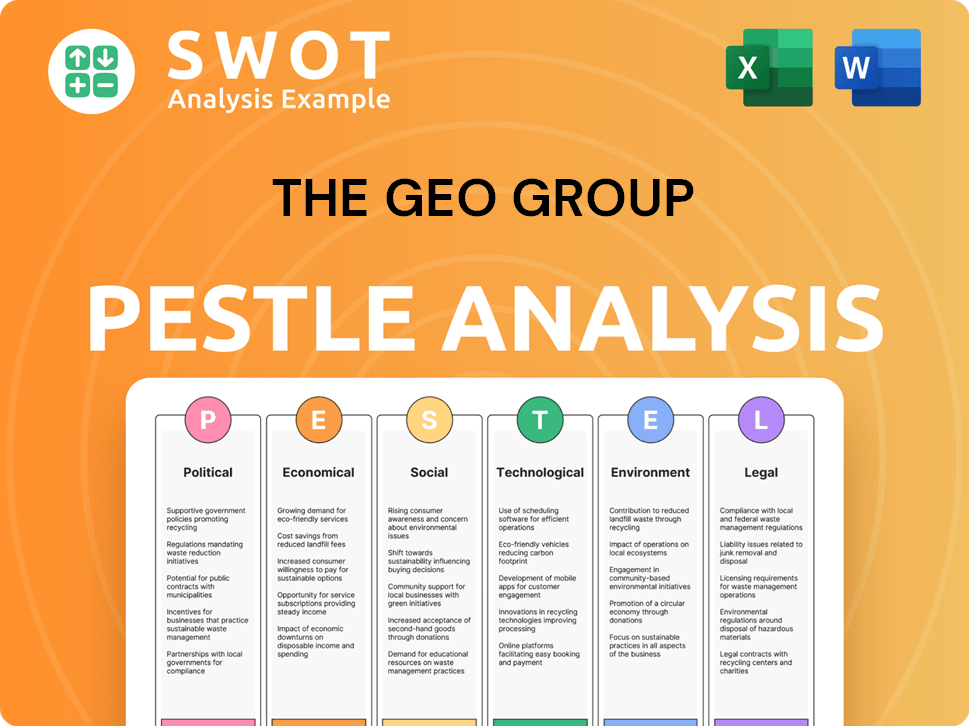
Who Sits on The GEO Group’s Board?
As of early 2025, the board of directors of the GEO Group, a leading private prison company, is pivotal in overseeing the company's strategic direction and governance. The board is composed of a mix of independent directors and individuals with connections to the company's history and specific areas of expertise. George C. Zoley continues to serve as the Executive Chairman of the Board. The composition of the board is influenced by the company's major shareholders.
The board typically includes independent directors to ensure external perspectives and adhere to corporate governance standards. These independent directors bring diverse skills and experiences, contributing to the board's ability to make informed decisions. The board's structure and the roles of its members are critical in overseeing the company's operations and ensuring accountability to its shareholders.
| Director | Role | Affiliation |
|---|---|---|
| George C. Zoley | Executive Chairman | The GEO Group |
| David J. Barron | Lead Independent Director | Independent |
| Brian Evans | Director | Independent |
The voting structure for the GEO Group generally follows a one-share-one-vote principle, common for publicly traded companies. Each share of common stock typically entitles its holder to one vote on shareholder matters, including the election of directors and approval of key corporate actions. There are no publicly disclosed special voting rights or dual-class share structures that would grant disproportionate control to specific entities. The ownership structure and voting rights are key factors for those considering how to invest in GEO Group stock.
The GEO Group's ownership structure is primarily influenced by institutional investors and individual shareholders. The company's stock ownership is subject to market dynamics and investor sentiment. Understanding the voting power and the roles of the board of directors is essential for anyone interested in the GEO Group company.
- The board of directors oversees the company's strategic direction.
- Voting rights typically follow a one-share-one-vote principle.
- Major shareholders can influence board composition.
- Independent directors provide external perspectives.
The GEO Group Business Model Canvas
- Complete 9-Block Business Model Canvas
- Effortlessly Communicate Your Business Strategy
- Investor-Ready BMC Format
- 100% Editable and Customizable
- Clear and Structured Layout
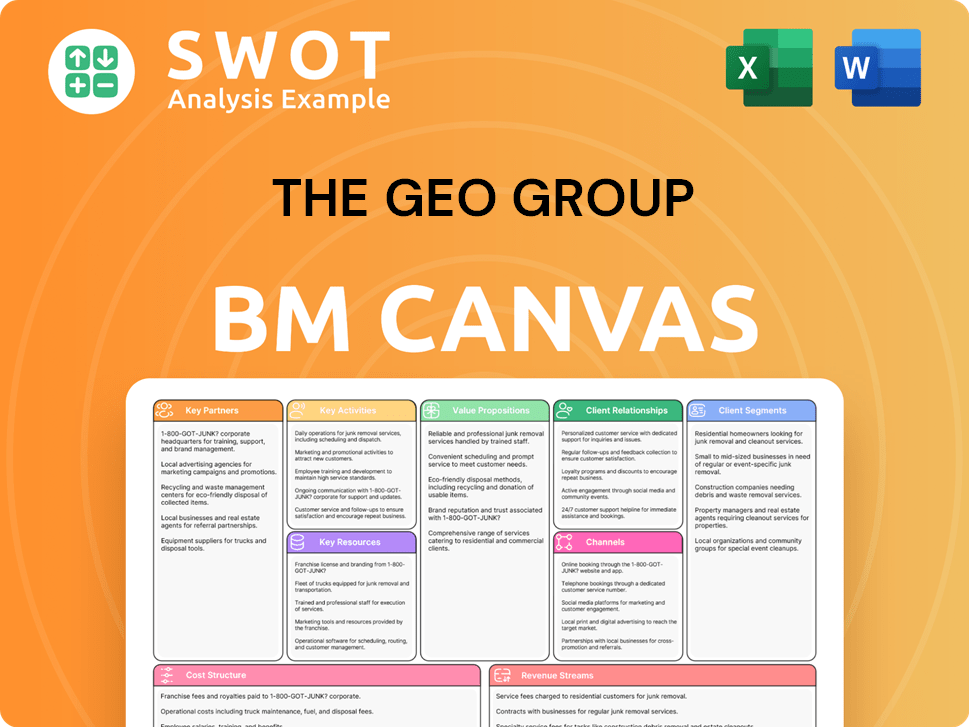
What Recent Changes Have Shaped The GEO Group’s Ownership Landscape?
In the past few years leading up to early 2025, the ownership structure of the GEO Group has seen shifts, significantly influenced by industry trends and strategic company decisions. The company has focused on reducing its debt, which could affect investor interest and potentially lead to share buybacks or asset sales. Simultaneously, the private prison company has faced pressure from institutional investors due to environmental, social, and governance (ESG) concerns related to the private corrections industry. This has prompted some investors to re-evaluate or decrease their holdings.
Industry-wide trends, such as the increased focus on ESG factors, have led GEO Group to emphasize rehabilitation programs and community-based services. This aims to diversify revenue streams and attract a wider investor base. While specific founder departures or new strategic investors with significant ownership stakes are not consistently highlighted in recent public filings, the company's ownership remains largely institutional. Any public statements by the company or analysts about future ownership changes, planned succession, or potential privatization/public listing would be closely watched by the market.
| Metric | Value (as of late 2024/early 2025) | Notes |
|---|---|---|
| Institutional Ownership | Approximately 80% | Represents the approximate percentage of shares held by institutional investors. |
| Debt Reduction | Significant reduction in debt over the past 3 years | Specific figures vary, but the trend indicates a focus on deleveraging. |
| ESG-Related Divestment Pressure | Increased scrutiny from ESG-focused investors | Leading to some institutional investors reducing or re-evaluating holdings. |
The company's ongoing efforts to manage its debt and adapt to the evolving political and social landscape surrounding private corrections will continue to shape its ownership profile. Any major changes in the ownership of GEO Group, like shifts in the largest shareholders or significant changes in the company's financial performance, would be of interest to those looking at how to invest in GEO Group stock. The company's contracts with the government and its business model are also important factors.
GEO Group's ownership is largely institutional, with a focus on debt reduction. Increased ESG scrutiny has led to investor re-evaluations. The company is adapting to changing industry dynamics.
Emphasis on rehabilitation programs and community-based services. Potential for share buybacks or strategic asset sales. Ongoing efforts to manage debt and adapt to the political climate.
Institutional investors are the primary holders. ESG concerns influence investment decisions. Changes in ownership could impact strategic direction.
The company's ability to adapt to changing conditions is key. Public statements about ownership changes will be closely watched. The evolving landscape will shape its future.
The GEO Group Porter's Five Forces Analysis
- Covers All 5 Competitive Forces in Detail
- Structured for Consultants, Students, and Founders
- 100% Editable in Microsoft Word & Excel
- Instant Digital Download – Use Immediately
- Compatible with Mac & PC – Fully Unlocked
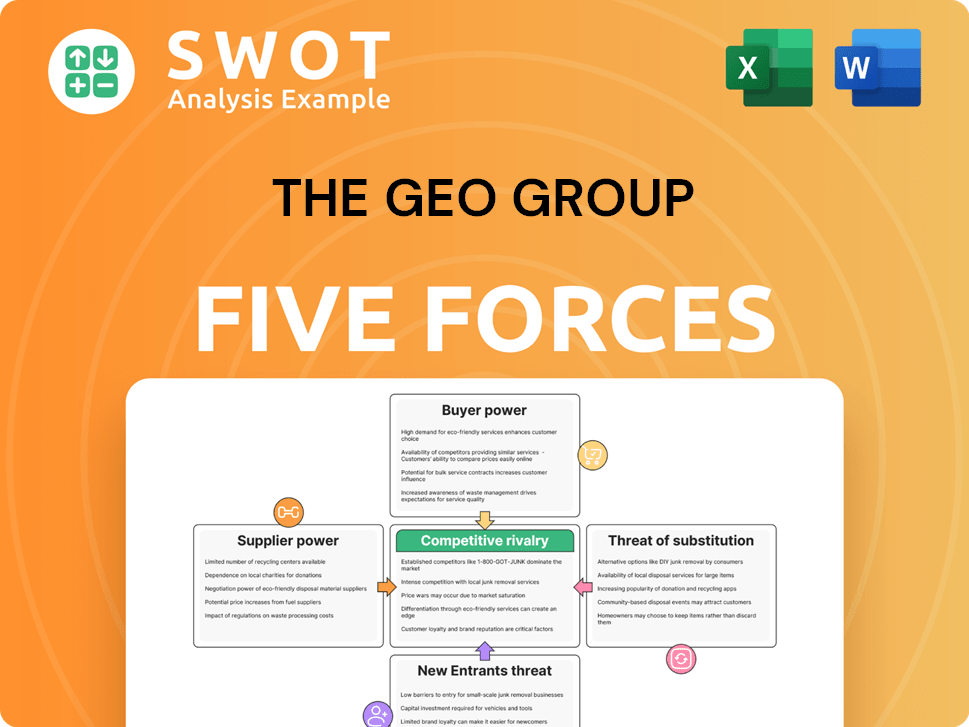
Related Blogs
- What are Mission Vision & Core Values of The GEO Group Company?
- What is Competitive Landscape of The GEO Group Company?
- What is Growth Strategy and Future Prospects of The GEO Group Company?
- How Does The GEO Group Company Work?
- What is Sales and Marketing Strategy of The GEO Group Company?
- What is Brief History of The GEO Group Company?
- What is Customer Demographics and Target Market of The GEO Group Company?
Disclaimer
All information, articles, and product details provided on this website are for general informational and educational purposes only. We do not claim any ownership over, nor do we intend to infringe upon, any trademarks, copyrights, logos, brand names, or other intellectual property mentioned or depicted on this site. Such intellectual property remains the property of its respective owners, and any references here are made solely for identification or informational purposes, without implying any affiliation, endorsement, or partnership.
We make no representations or warranties, express or implied, regarding the accuracy, completeness, or suitability of any content or products presented. Nothing on this website should be construed as legal, tax, investment, financial, medical, or other professional advice. In addition, no part of this site—including articles or product references—constitutes a solicitation, recommendation, endorsement, advertisement, or offer to buy or sell any securities, franchises, or other financial instruments, particularly in jurisdictions where such activity would be unlawful.
All content is of a general nature and may not address the specific circumstances of any individual or entity. It is not a substitute for professional advice or services. Any actions you take based on the information provided here are strictly at your own risk. You accept full responsibility for any decisions or outcomes arising from your use of this website and agree to release us from any liability in connection with your use of, or reliance upon, the content or products found herein.